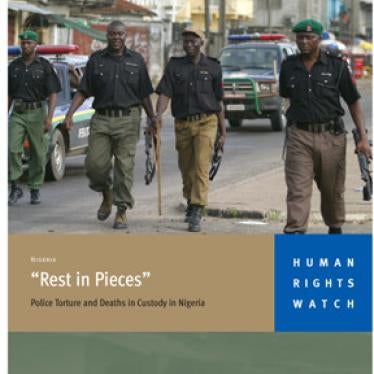(New York, July 10, 2003) - U.S. President George Bush should strongly condemn recent incidents of police brutality when he visits Nigeria, Human Rights Watch urged today.
President Obasanjo should also make an explicit commitment not to shield Liberian President Charles Taylor from justice.
Over the last two weeks in Nigeria, several people have been shot dead by the police and others severely beaten, Human Rights Watch said. The incidents form part of a broader pattern of increased harassment and intimidation of critics of the Nigerian government.
"Bush is coming to Nigeria at a critical moment, and he can't ignore this violence," said Peter Takirambudde, executive director of the Africa Division of Human Rights Watch. "The improvements in civil liberties since the advent of civilian rule in Nigeria are now being reversed."
Human Rights Watch also urged President Obasanjo to ensure that his recent offer of a "safe haven" for Charles Taylor does not effectively protect the Liberian president from prosecution. Despite championing the notions of human rights and justice in international fora, President Obasanjo appears ready to allow the Liberian president to evade justice.
"There is an international indictment against Charles Taylor for war crimes and crimes against humanity," said Takirambudde. "By letting him off the hook, President Obasanjo would be signaling his complete disregard for the principle of justice - a stand which, unfortunately, tends to mirror the situation within Nigeria itself."
A sharp increase in the price of fuel sparked a general strike and widespread protests in Nigeria from June 30 to July 8. Police used teargas and live shots to disperse protesters. While there were reports that some protestors had resorted to violence, many protests were completely peaceful.
On July 3, about thirty people were reportedly arrested in Abuja after delivering a petition to the U.S. embassy, protesting President Bush's visit to Nigeria on the grounds that it conferred legitimacy on President Obasanjo's government. Five days later, they remained in detention without charge, in an undisclosed location.
Some of the detainees were brought to the national police headquarters where they told colleagues that the police accused them of embarrassing the Nigerian government. They also claimed that the police had subjected them to intense pressure to "confess" that their protest to the U.S. embassy had been sponsored by the presidential candidate of Nigeria's main opposition party, the All Nigeria People's Party (ANPP).
On July 7, at least six people, and possibly several more, were shot dead by the police in Lagos. Eyewitnesses told Human Rights Watch that in several parts of the city, the police opened fire on the crowds indiscriminately. For example, in Yaba, a young man in his twenties was shot dead as he stood outside his house. Witnesses described the police action in Yaba as completely unprovoked and said the protests had been peaceful until the police started dispersing the crowds.
In Akowonjo, at least three people were reported to have died and several more injured as a result of police shootings. The police have denied any knowledge of the shootings in Lagos.
In the southern city of Port Harcourt, three people including two secondary school students were shot dead on July 2 as police dispersed a student protest on the Port Harcourt-Aba express road. Several students were also beaten by police and arrested in a separate student protest on the Ikwerre Road the same day.
In Abuja on July 1, a group of more than ten policemen assaulted an Associated Press photographer who was taking photographs of a protest rally. They beat him severely with whips and rifle-butts, kicked him, and smashed his cameras. The policemen said that they were beating him because of the pictures he and other journalists were taking.
Two reporters working for the Vanguard newspaper were also beaten the same day. At least two journalists, including one of the Vanguard reporters, were also arrested. They were released later the same day.
"President Bush cannot pretend it is business as usual in Nigeria when people have been brutalized by the police only days before his visit," said Takirambudde.
The Nigerian government should issue clear instructions to the police to allow peaceful protests and to refrain from using excessive force against people who are not engaging in violence. It should also release those arrested in connection with the protest at the U.S. embassy, unless there are grounds for charging them with a recognizable criminal offense.






